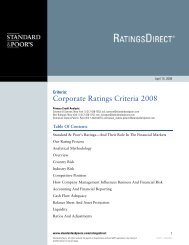European Infrastructure Finance Yearbook - Investing In Bonds ...
European Infrastructure Finance Yearbook - Investing In Bonds ...
European Infrastructure Finance Yearbook - Investing In Bonds ...
You also want an ePaper? Increase the reach of your titles
YUMPU automatically turns print PDFs into web optimized ePapers that Google loves.
UTILITIES<br />
18 ■ NOVEMBER 2007<br />
Limited Nuclear Revival <strong>In</strong> The EU<br />
Nevertheless...<br />
Following the commissioning in September 2007<br />
of the Cernavoda 2 reactor in Romania, 146<br />
reactors are currently in operation in the EU<br />
providing 30% of the region’s electricity.<br />
Only four plants are currently being built and<br />
another four are planned (see table 1). This<br />
compares with 33 plants being currently built<br />
worldwide and 94 planned. A number of<br />
additional nuclear plants are being considered in<br />
other EU countries, especially the Czech Republic<br />
and Finland as well as Lithuania and Romania,<br />
but with no firm commitment so far.<br />
...Given Relatively Limited Political And<br />
Public Support So Far...<br />
Although the EU is generally supportive of the<br />
development of nuclear power, support at state<br />
level is more mixed.<br />
Recognizing the right of each member state to<br />
decide on its energy mix, in March 2007 the EU<br />
Council underlined nuclear power’s place within<br />
the region’s carbon-reduction strategy, and its<br />
contribution to addressing growing concerns<br />
about security of supply. However, the council<br />
also highlighted nuclear power’s drawbacks in<br />
terms of safety, decommissioning, and<br />
waste management.<br />
Within the EU, some countries are clearly<br />
supportive of nuclear power, especially France,<br />
Finland, and a number of Eastern <strong>European</strong><br />
countries. <strong>In</strong> The Netherlands, the government<br />
Country Existing nuclear phase out legislation/policy State of debate<br />
Belgium A 2003 law imposes the closure of nuclear plants after 40 The "Commission Energie 2030" in its<br />
years of operation--with exceptions possible for security of 2006 report recommended the reversal<br />
supply concerns--and prohibits the building of new nuclear<br />
plants. Gradual phase out planned to be completed in 2030,<br />
with first plant closure to occur in 2015.<br />
of the nuclear phase out policy.<br />
Germany Based on the "Atomausstiegsgesetz" law, government and The German government's coalition<br />
nuclear operators agreed in 2001 to limit the average life agreement includes a clause stating<br />
of nuclear plants to 32 years based on production quotas. that there is no agreement on this<br />
The building of new nuclear plants is also prohibited. matter.<br />
Spain Policy is to phase out nuclear power but no schedule or Policy of current government is to reduce<br />
specific strategy set. recourse to nuclear power without<br />
compromising security of supply.<br />
Sweden The "Nuclear Power Decommissioning Act" of January 1998 No decision on phasing out of nuclear<br />
allows the government to decide that the right to operate a power to be taken by current<br />
nuclear power plant will cease to apply at some point. Such government during term in office<br />
a decision infers the right to compensation from the state. (2006-2010).<br />
Source: Standard & Poor's.<br />
Table 2 - Nuclear Power Phase Out Policies <strong>In</strong> Europe<br />
STANDARD & POOR’S EUROPEAN INFRASTRUCTURE FINANCE YEARBOOK<br />
Table 1 - Nuclear Power Plants <strong>In</strong> the EU<br />
Nuclear reactors<br />
Under<br />
Operational construction Planned<br />
France 59 1 0<br />
Germany 17 0 0<br />
Spain 8 0 0<br />
Sweden 10 0 0<br />
United Kingdom 19 0 0<br />
Finland 4 1 0<br />
Bulgaria 2 0 2<br />
Romania 2 0 2<br />
Slovakia 5 2 0<br />
Others 20 0 0<br />
Total 146 4 4<br />
Source: World Nuclear Association, October 2007.<br />
signed the Borssele covenant in June 2006, under<br />
which the operating life of the country’s only<br />
nuclear power station in Borssele has been<br />
extended until 2033 at the latest, as long as it<br />
remains in the top quartile of the safest power<br />
stations of its kind within the EU, the U.S., and<br />
Canada. <strong>In</strong> its May 2007 energy white paper, the<br />
British government also clearly reiterated its<br />
support for new nuclear power stations, the costs<br />
of which, including for decommissioning and<br />
waste disposal, must, however, be entirely borne<br />
by the private sector.



